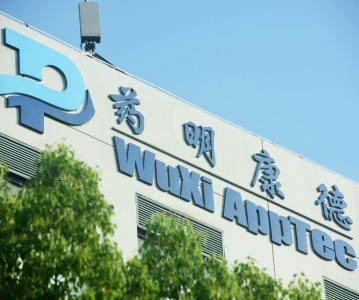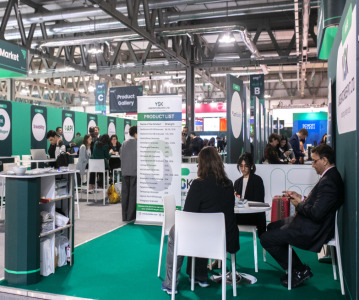Glycotope Reported Promising First-in-Man Data of Novel Glyco-Optimised Monoclonal Anti-TA-MUC1 Antibody PankoMab-GEX

Glycotope GmbH, a global leader in optimising the sugar chains (glycosylation) of biopharmaceuticals, has announced full details of its first-in-man Phase I trial for PankoMab-GEXTM at this year's European Cancer Congress (ECCO 17). PankoMab-GEX is a potent humanised and glycoengineered antibody with respect to its specificity and anti-tumour activity recognising the novel tumour-specific epitope TA-MUC1 expressed in the majority of solid cancer indications and patients and virtually absent on normal cells.
In conclusion, PankoMab-GEX clearly demonstrated clinical activity as single agent in heavily pretreated progressive patients with far advanced cancers and could be safely administered at all tested doses and schedules with a very favorable safety, side-effect and pharmacokinetic profile.
In the open label Phase I dose escalation study (3+3 design), 74 patients with TA-MUC1-positive advanced solid tumours, all progressing after standard treatments, were treated with various doses of PankoMab-GEX from 1 to 2200 mg with three dosing schedules (once every three weeks, once every two weeks and weekly). The primary objective of the study was to evaluate the safety and tolerability profile of this novel compound and to define the recommended Phase II dosing regimen. Secondary endpoints included pharmacokinetics, immunogenicity and object-tumour response.
Activity was seen over all dose levels, with a clinical benefit rate of 50% at dose levels of >= 600 mg (19/34). One complete response in ovarian cancer for 485 days and one partial response for 295 days in non-small cell lung cancer (NSCLC) were observed (RECIST 1.1). The other patients showed continuing sustained clinical benefit in various cancers with an average duration of >240 days and the longest duration of 25 months (patient with pseudomyxoma peritonei with >20% tumour reduction). In the subgroup of ovarian cancer patients the clinical benefit rate at dose levels of >= 600 mg was 60% (9/15) including one complete responder. Progressive ovarian cancer patients previously sensitive or resistant to their last platinum therapy, regardless of additional refractory treatments, showed clinical benefit in all platinum sensitive (5/5) and in most resistant (3/5) patients. One patient refractory to platinum (1/5) showed an extended clinical benefit. NSCLC patients, albeit only treated with lower doses of PankoMab-GEX, showed in four of seven patients a clinical benefit including one partial responder.
PankoMab-GEX showed a very favorable side-effect profile with mild to moderate adverse events, mainly infusion related reactions during the first infusion. No maximum tolerated dose was reached. As expected because its high specificity, pharmacokinetics were linear over all doses with a long half-life allowing administration schedules once every three weeks or shorter.
Steffen Goletz, CEO, CSO and Founder of Glycotope, commented: "We are very pleased with these data. PankoMab-GEX has shown an excellent safety profile at all dose levels and promising efficacy results in heavily pretreated cancer patients already as a single agent. Because of its high specificity and long duration of action, PankoMab-GEX is a highly attractive option for the future treatment of various solid tumors and will be further developed in Phase II trials."
Related News
-
News WuXi to sell CGT manufacturing unit to US-based Altaris LLC
At the tail end of 2024, Chinese-based CDMO WuXi AppTec announced the signing of their deal with private equity firm Altaris LLC, confirming the sale of WuXi Advanced Therapies, the cell and gene therapy manufacturing arm of WuXi AppTec. -
News Women in Pharma: Our hopes for 2025 and beyond
Our last instalment for 2024 of the Women in Pharma series brings you messages direct from the Informa Markets CPHI team as they discuss the advice and insights they have carried throughout their roles working at CPHI, and what they hope to see for the... -
News CPHI Milan Wrap-Up Report: Conference Highlights
Discover the emerging and trending topics of the pharmaceutical industry with our CPHI Milan Conference Highlights, with exclusive insight from pharmaceutical leaders and experts! -
News BIOSECURE Act not included in key defense spending bill for 2025
On December 7, 2024, the Biden administration revealed the 2025 National Defense Authorization Act, an annual defense bill specifying the budget and expenditures of the US Department of Defense. The controversial BIOSECURE Act was notably missing from ... -
News Lessons from CPHI Milan 2024: Sunny Intervals for Pharma Manufacturing?
As the 2024 CPHI conference wrapped up in Milan, we caught up with L.E.K. Consulting – a global strategy consulting firm with deep expertise in pharma manufacturing – to discuss evolving market perspectives and business outlook. -
News Trump 2.0: What does the US election result mean for the healthcare industry?
After Trump won the Presidential election in the US in early November, we take a look at some of the implications a new Trump administration could have on the health and pharmaceutical industry, and on US patients. -
News Women in Pharma: Reflections from Behind the Scenes
In this instalment of our monthly series, the team that brings you the Women in Pharma series each month sits down for a heart-to-heart on what the series means to them, and how they hope to continue their work in the future. -
News Scaling the Industry: CPHI Scale-Up Market interview with YSK Laboratories
For the first time, CPHI Milan hosted the CPHI Start-Up Market, expanding support for emerging and small-sized enterprises in their transition to the next level of growth. In this interview, we spoke with Yuvansh Khokhani, Managing Director of YSK Labo...
Position your company at the heart of the global Pharma industry with a CPHI Online membership
-
Your products and solutions visible to thousands of visitors within the largest Pharma marketplace
-
Generate high-quality, engaged leads for your business, all year round
-
Promote your business as the industry’s thought-leader by hosting your reports, brochures and videos within your profile
-
Your company’s profile boosted at all participating CPHI events
-
An easy-to-use platform with a detailed dashboard showing your leads and performance

.png)





